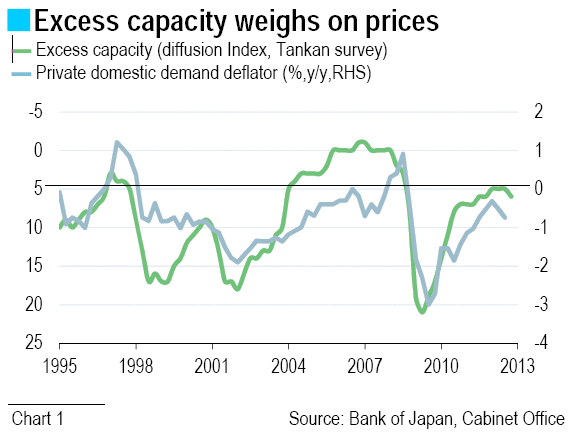- In a joint statement, the government and the BoJ have set out a new strategy to overcome deflation. It includes the raising of the inflation target to 2%.
- The coordination of macroeconomic polices by the Council on Economic and Fiscal Policy is an infringement on the BoJ’s independence.
- The prospect of looser macroeconomic policies has led to a sharp depreciation of the yen. This has raised the spectre of competitive devaluations.
Last Tuesday, after the regular Bank of Japan’s Policy Board meeting, the government and the Bank of Japan issued a joint statement. It announced that the Bank had set a new inflation target of 2%. The BoJ promised to pursue monetary easing to achieve this target at the earliest possible time. The government, for its part, promised to formulate measures for strengthening competitiveness and the growth potential of the Japanese economy. The statement concluded by declaring that the supervision of macroeconomic policy including monetary policy was transferred to the Council on Economic and Fiscal Policy.
This is an 11-member government body, which includes some ministers handling economic and fiscal policies, BoJ Governor Masaaki Shirakawa, business leaders and academics. After having been dormant during the DPJ governments, it has recently been revived by Prime Minister Shinzo Abe. This is an infringement of the BoJ’s independence.
The BoJ’s actions against deflation
The Japanese economy has been confronted with declining prices for almost two decades. These price declines are partly due to technological development, improvements in productivity, improved distribution and globalisation. Another factor is that Japanese workers are willing to accept lower wages in order to maintain employment.
Finally, the decline in prices is certainly also related to the persistent overcapacity, the so-called output gap. The output gap is not measured but estimated. For example, the OECD estimates that the Japanese economy was operating 2% below its potential GDP in 2012. The BoJ’s Tankan survey confirms the persistence of substantial excess capacity (see Chart 1).
Expansionary macroeconomic policy is the traditional recipe for getting the economy out of a slump. In the case of Japan, the room for fiscal stimulus is limited as the government debt has increased to more than 220% of GDP.
By Raymond VAN DER PUTTEN
To Read the Entire Report Please Click on the pdf File Below.
